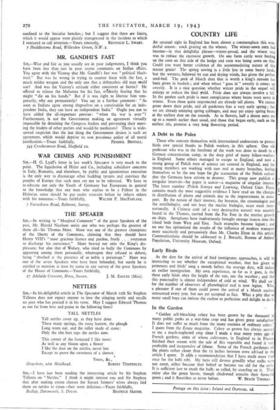COUNTRY LIFE
An unusual sight in England has been almost a commonplace this won_ derful season: stock grazing on the wheats. The winter-sown corn had become—in that delightful phrase—winter-proud, and the wisest step was to reduce the excessive growth. On one farm cattle were feeding on the corn on this side of the hedge and corn was being sown on that. Could you want better evidence of the accommodating nature of this master grain? The spring sowing is a little late in some heavy lands, but the wetness, followed by sun and drying winds, has given the perfect seed-bed. The peck of March dust that is worth a king's ransom has been given in bushels ; and when wheat " goes in " sweetly it comes up sweetly. It is a nice question whether winter pride in the sequel will enlarge or reduce the final yield. Pride does not always involve a fall. In the garden such pride is most conspicuous where beans were sown in winter. Even those quite unprotected are already tall plants. We cannot graze down their pride, and all gardeners fear a very early spring ; but we are already enjoying spring cabbages, and may yet enjoy spring beans at the earliest date on the records. As to flowers, half a dozen sorts are up to a month earlier than usual, and those that began early, such as the earliest iris, promise a very long flowering period.
A Debt to the Poles Those who concern themselves with international endeavours to protect birds owe special thanks to Polish workers in this sphere. One old professor who was in the forefront of the work was done to death in a German concentration camp, to the deep grief of many fellow-workers in England. Some others managed to escape to England, and now a strong group of Polish men of science are centred in England, and the young members are working with rare zeal at many branches, feeling themselves to be the one hope for She restoration of the Polish culture that the Germans have striven to destroy. This group now publish at irregular intervals—for paper is scarce—a magazine of singular interest. The latest number (Polish Science and Learning, Oxford Univ. Press) contains much the most suggestive evidence I have read on the changes in distribution of plants and animals due to the improvement in trans- port. By the nature of their interest, the botanist, the entomologist and the ornithologist, and not least the marine biologist, must work inter- nationally. A Chinese crab (of a very destructive nature) was recently found in the Thames, carried from the Far East in the marine growth on ships. Aeroplanes have inadvertently brought strange insects into this island both from West and East. Such examples become legion ; and no one has epitomised the results of the influence of modern transport more succinctly and persuasively than Mr. Charles Elton in this article. Communications should be addressed to J. Boruchi, Bureau of Animal Population, University Museum, Oxford.
Early Birds
As the date for the arrival of bird immigrants approaches, it will be interesting to see whether the exceptional weather, that has given w primroses and birds' song a month before the average date, will induce an earlier immigration. My own experience, so far as it goes, is that these early birds obey the height of the sun, not the weather ; and that this punctuality is almost independent of cold or wind. We shall see ; for the number of observers of phenological zeal is now legion. What a pleasure if one of them could prove the arrival qf a March cuckoo, announced every year. but not yet accepted as fact. What a pity that so many small boys can imitate the cuckoo to perfection and delight to do it.
In the Garden " Golden self-bleaching celery has been grown by the thousand in many public parks as a war-time crop and has given great satisfaction. It does not suffer so much from the many enemies of ordinary celery.' I quote from the Estate magazine. Celery so grown has always seemed to me a much-neglected crop since I made a tour many years ago of French gardens, some of whose cultivators, in England as in France, finished their season with the sale of this vegetable and found it very profitable and inexpensive of labour. Some of the French gardeners set the plants rather closer than the is inches between rows advised in the article I quote. It adds a recommendation that I have made more than once for the kohl rabi. My hens still devour greedily what stalks were not eaten, either because they bolted or became too old for the table. It is sufficient just to crush the bulb, so called, by standing on it. They enjoy also the green leaves, though chickweed remains their favourite
green ; and it flourishes as never before. W. BEACH THOMAS.
Postage on this issue : Inland and Overseas, ad.


























 Previous page
Previous page